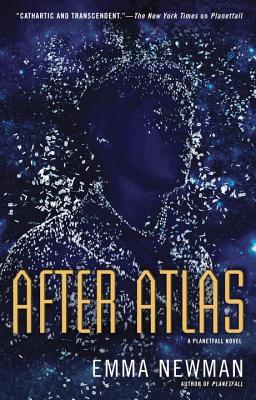My regular readers will have realized that my blog has been quiet lately. This has been caused by a couple of factors. The first is a personal thing that I will likely blog about within a few days. The second is the recent American presidential election. The results of the election–and its consequences for women, people of color, immigrants, the climate, the law, the future–well, it’s just depressing as hell. So it’s odd that I would look for escape in a book that deals with governments run by corporations, omnipresent surveillance, and people distracted by social media and games. But After Atlas by Emma Newman did turn out to be just the trick to cheer me up. Not only did I really like the world building, but like Planetfall, Emma has once agree created compelling, damaged characters. Only this time it’s not a sci-fi story but a murder mystery.

The Story
Carlos Moreno is an indentured servant owned by his govcorp’s ministry of justice. When he was young, his mother left Earth on the Atlas, seeking God on another planet. Carlos’ dad had a breakdown, finally resurfacing in a religious cult known as the Circle and run by Alejandro Casales. Decades after Carlos’s escape from the Circle, and as the 40th anniversary of the Atlas’s launch nears, Moreno is called in to investigate the bloody murder of Casales. The more Moreno looks into the death of one of the world’s most powerful men (who used to be his surrogate father), the more sinister it appears–and the more Moreno realizes he can’t escape his past.
The Review
After Atlas is a standalone companion to Planetfall. You don’t need to have read Planetfall, and you could even read After Atlas first. Whereas Planetfall was a sci-fi story, this is more of a straight-up murder mystery (albeit with a few sci-fi elements). But this story is not a simple procedural. Think of it more as a procedural-plus. Yes, there are noirish elements to this story, but Moreno is more than a typical gumshoe. Most importantly, he is not a cipher–a sarcastic, cynical, disembodied voice. Instead, Newman has given him a strong internal plot line.
And as interesting as the mystery is, I was far more interested in Moreno’s life. He has had to make terrible choices after he ran away from Casales and the Circle. And while he has found a modicum of peace as a detective, his life is bound by a number of terrible constraints. And he is always at risk of losing what little he has fought for. It’s a terrible, desperate life. But he is resilient and tough and determined. It makes for a fascinating read, much like Newman did with her mentally ill protagonist in Planetfall.
And as I mentioned above, I’m a big fan of Newman’s world building here. The mix of near-future technology is realistic and cool, if a little creepy. Cameras are everywhere, and everyone is chipped. While Morales has an AI assistant who can help him walk through a case in a VR recreation that is picture perfect, govcorps can buy and sell people through that same mental implant. Every act is monitored, measured, reported, and filed away. Ads are inserted into nearly all of your everyday experiences. Only the wealthy can afford any real privacy.
Conclusion
The bottom line is that while After Atlas does feature some of the worst aspects of a future world under a Trump-like rule, it also offered just the escapism I wanted. Morales is so focused on solving the crime. This single drive propels the story forward and sucks in my attention. Because of his past, Newman creates a lot of empathy and sympathy for him. And in this new America, a little more sympathy and empathy are good things. And on top of that, this is a great mystery, filled with conspiracies, red herrings, and many twists and turns. So disappear from the world for a while. Unplug and disconnect. Fall into this book. The world will still be there when you return. But in the meantime, Newman has written a wonderful story.